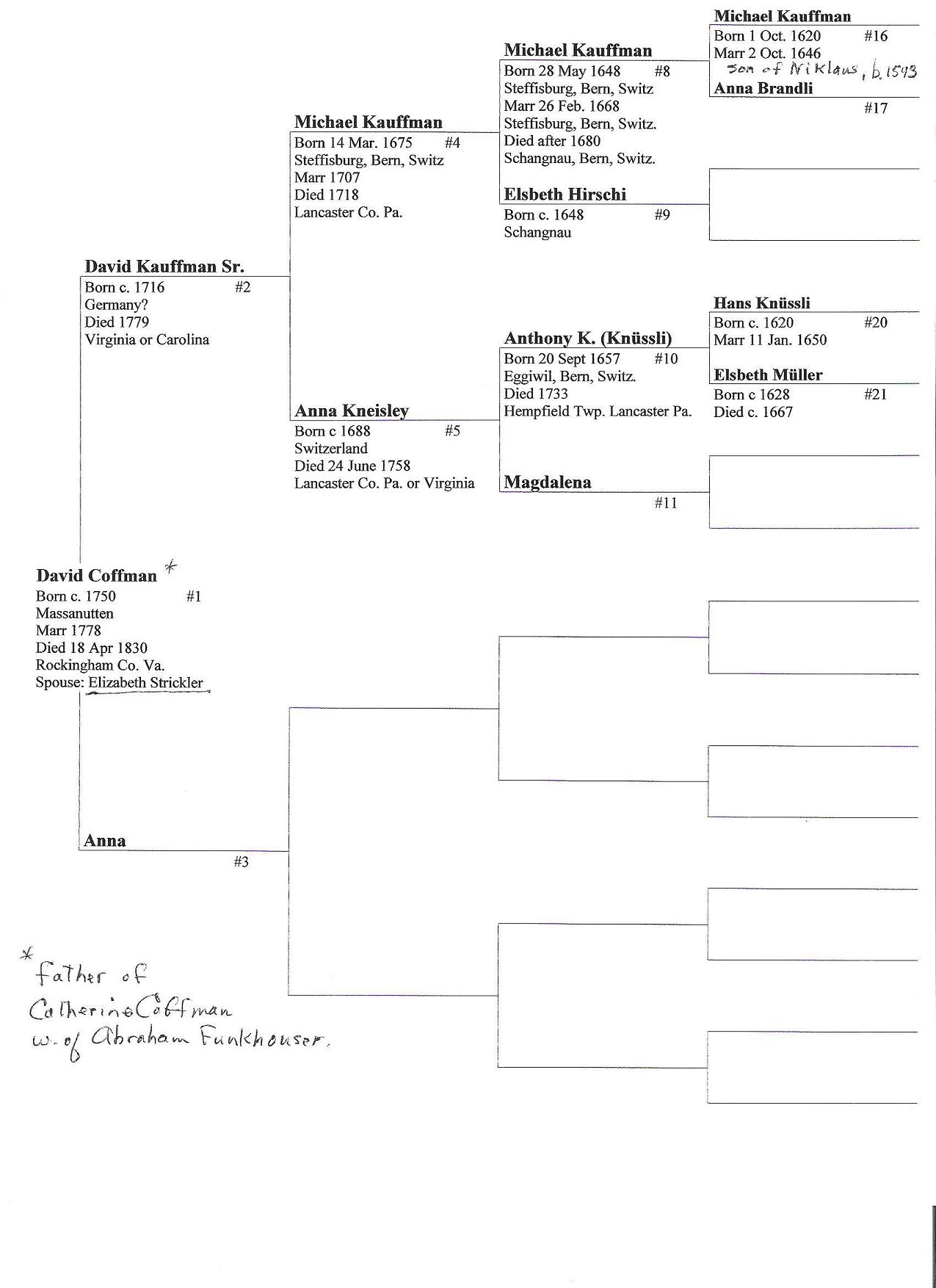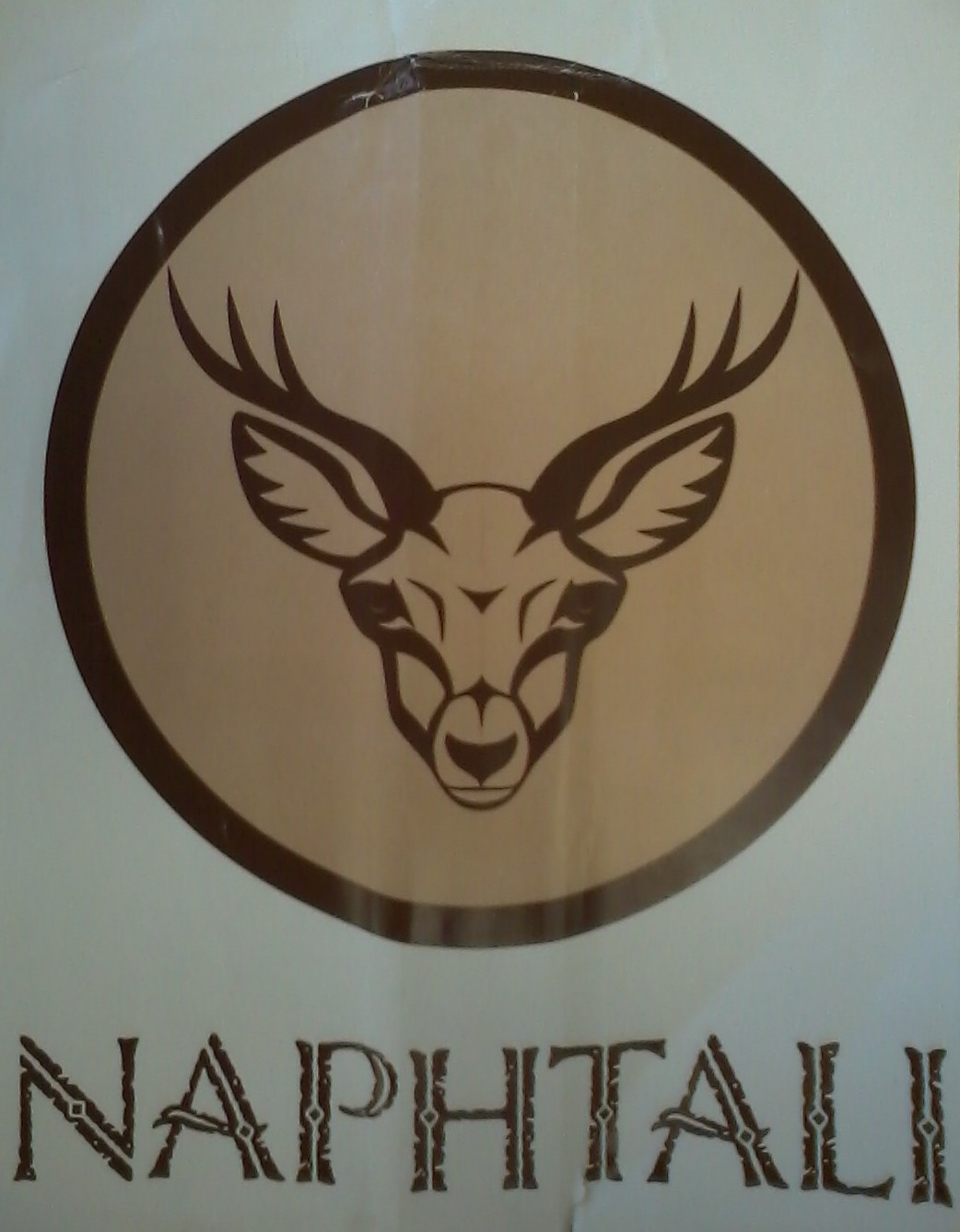| "David Kauffman (d. about 1779). May 8, 1741, his name appears on a deed recorded in Orange Co., Va., at which time Henry Crum of St. Mark's Parish, Orange Co., Va., deeded to David Kauffman of same place a parcel of land begin ning on north side of Hawkbill Run and running thence S. 40 degrees W. 240 poles to 3 white oaks and 2 little swamp oaks; thence S. 80 poles to a black oak and red oak; then N. 75 degrees E. 305 p.; then N. 25 degrees E. 20 p. to 2 pines; then N. 25 degrees W. 90 p. to a pine; then N. 55 W. 135 p. to beginning, containing 200 acres more or less sealed with 5 shillings and on following day May 9, 1741, paid 70 pounds Pennsylvania currency. The transaction was witnessed by John Newport, Christopher Zimmerman, and Leonard Ziegler. When Martin Kauffman died in 1749, David Kauffman is mentioned as a witness. In the Virginia muster roll for 1755, Capt. William Bethel lists David Coffman as a delinquent. This is the year of Braddock's defeat during the French and Indian War. Apparently he left the Colony for a safer region about this time - possibly South Carolina. The Patent Office at Richmond gives two transactions, (1) Lord Fairfax to Martin Coffman of Shenandoah Co., Va., heir at law of David Coffman, deceased, a tract bounded as by a survey thereof dated Apr. 18, 1751, and made for David Coffman by George Hume and forfeited by virtue of an advertisement issued from my office and recorded in Book N; but on application, I have allowed a deed to be issued to said Martin Coffman for said 282 acres on Mar. 22 , 1779. Lord Fairfax to Martin Coffman of Shenandoah Co., Va., heir at law of David Coffman deceased as in above for 337 acres dated Mar. 23, 1779. No will or intestate records appear for David Coffman in Pennsyl vania, Virginia, or the Carolinas. However, it is thought that he may have lived in Orangeburgh Co., S.C., where the county records were destroyed in the Civil War. In 1783 Martin Coffman, eldest son of David Coffman, deeded 90 acres to Christian Coffman. This is part of the original part gotten from Crum. On May 27, 1783, Martin Coffman, eldest son of David Coffman, deceased was transferred to David Coffman, it being a part of the 200 acres purchased of Crum in 1741 and recorded in Orange Co., Va., part of 282-acre parcel granted to David Coffman Mar. 22, 1779, and part of 337-acre tract acquired Mar. 23, 1779. The part deeded to David Coffman was 360 acres. The remainder of the tract or 409 acres was retained by Martin Coffman (pp. 561-562 of A Genealogy and History of the Kauffman-Coffman Families of North America 1584 to 1937, compiled by Charles F. Kauffman). | "Michael Kaufmann (Oct. 1, 1620-) md. Oct. 2, 1646, Anna Brendli. His sponsors were Hans Spori, Hans Rüfenacht, and Margret Sträler. His wife was sponsor Oct. 1, 1665, for a child of Jacob Mosimann and Anna Kaufmann. She also sponsored a child for a family Gerber-Lehman who were Mennonites, Jan. 24, 1664. They lived at Zullhalten which lies eastward of Steffisburg and contiguous to Homberg and not far from Farni. 1- Michael Kaufmann (May 28, 1648-) md. Feb. 26, 1668 Elsbeth Hirsing from Schangnau. He lived at Langenegg. Either he or his cousin Michael was constantly at odds with the law. May 10, 1674, he and three others did not attend Easter week services and were hailed into court and severely reprimanded. Jan. 9, 1676, he was accused of being heard playing with dice in his home, but he explained that no money or other valuables were put up to be won. The court fined him 10 shillings. May 1, 1677, since he had been before the court frequently, he promised if they were lenient he would try hard to reform, but he was given a fine of one pound. Mar. 21, 1680, Christian Burger of Langenegg was charged with giving wine away but explained that Michael Kaufmann gave it to him instead of cash out of the estate of Christian Reusser and that he, Christ Burger, agreed to the transaction. The court decided that he must dole out drink in regular order and not get drunk every night as it seems. It is presumed he moved away about this time. An account appears in Sept., 1653, which relates to his father , Michael Kaufmann , who seems to have been among those taking part in the Peasants Re bellion which was severely crushed , and the property of the leaders was confiscated (see Schiffmann, Steffisburg, S . 79)" (pp. xiv-xv of A Genealogy and History of the Kauffman-Coffman Families of North America 1584 to 1937, compiled by Charles F. Kauffman). |
Information about David Kauffman, Sr., (1716-1779) and Michael Kauffman (b. 1620) above.
Note: Anna Kneisley/Kneicely/Knicely was the second wife of Michael Kauffman (1675-1718) according to the Harrisonburg-Rockingham Historical Society, Roberta Miller Herbert Collection in the Coffman file.
|
Descendants of David Coffman ← More information about David Coffman from A Genealogy and History of the Kauffman-Coffman Families of North America 1584 to 1937, compiled by Charles F. Kauffman 1803-1806 Journal Names, compiled by Calvin "Cal" Sonner, a journal believed to be from the Toms Brook, VA, area (just a few miles south of Strasburg) and relating to a tannery, mentions David Coffman. |

|
→ Ancestry via parents Nicklaus and Elsi (Blank) Kauffman Brandli - This early surname is of pre 5th century Germanic origins. Recorded in over fifty different spellings including Brand, Brandt, Braund, Brando, Brann, Braun, Bront, and many others, it usually derives from the male given name "Brando". This is itself a short form of a popular compound personal name such as Hildebrand, and originates from "brinnan", meaning a flash, as in a flash of lightning. The name can also be topographical and relate to a person who lived by a "brant". This word described an area of agricultural land, one which was cleared by fire, a common practice in ancient times. In England this word appears in many village names including examples such as Brandeston in the county of Suffolk, and Branston in the county of Leicestershire. These places were recorded prior to the year 1066, the year of the Norman Invasion, and suggest that Brant and Brand as first names, were introduced into the country by the Anglo-Saxons perhaps as early as the year 450 a.d.. Early examples of the surname recordings include Ralph Brand, in the 1184 pipe rolls of the city of London, and in Germany Otho de Brande from Neuburg, in the year 1271.The first recorded spelling of the family name anywhere in the world is probably that of William Brant, which was dated 1086, in the Domesday Book for the county of Norfolk, England. This was during the reign of King William 1st, known as "The Conqueror", 1066 - 1087. Throughout the centuries, surnames in every country have continued to "develop" often leading to astonishing variants of the original spelling. (SOURCE: https://www.surnamedb.com/Surname/Brandli) Müller (Muller) is a German surname from an occupation, in this case, miller (source). Hirschi is Swiss German: diminutive of Hirsch. (SOURCE: http://www.ancestry.com/name-origin?surname=hirschi) The meaning of the name Hirsch: 
(SOURCE: http://lastnames.myheritage.com/last-name/Hirsch). According to 23andMe.com, I do not have any Jewish/Ashkenazic in my DNA. However, in 2018, MyHeritage estimated I am 5.9% Ashkenazi Jewish. Hirschi - This German and Swiss name was of the locational group of surnames meaning 'the dweller at the sign of the red deer'. It may also have been used as a nickname for one with the characteristics of a deer. The name is also spelled HERSHEY, HIRSHFELD, HERSH, HERSCH and HERRSCHER. (SOURCE: http://www.4crests.com/hirschi-coat-of-arms.html) |